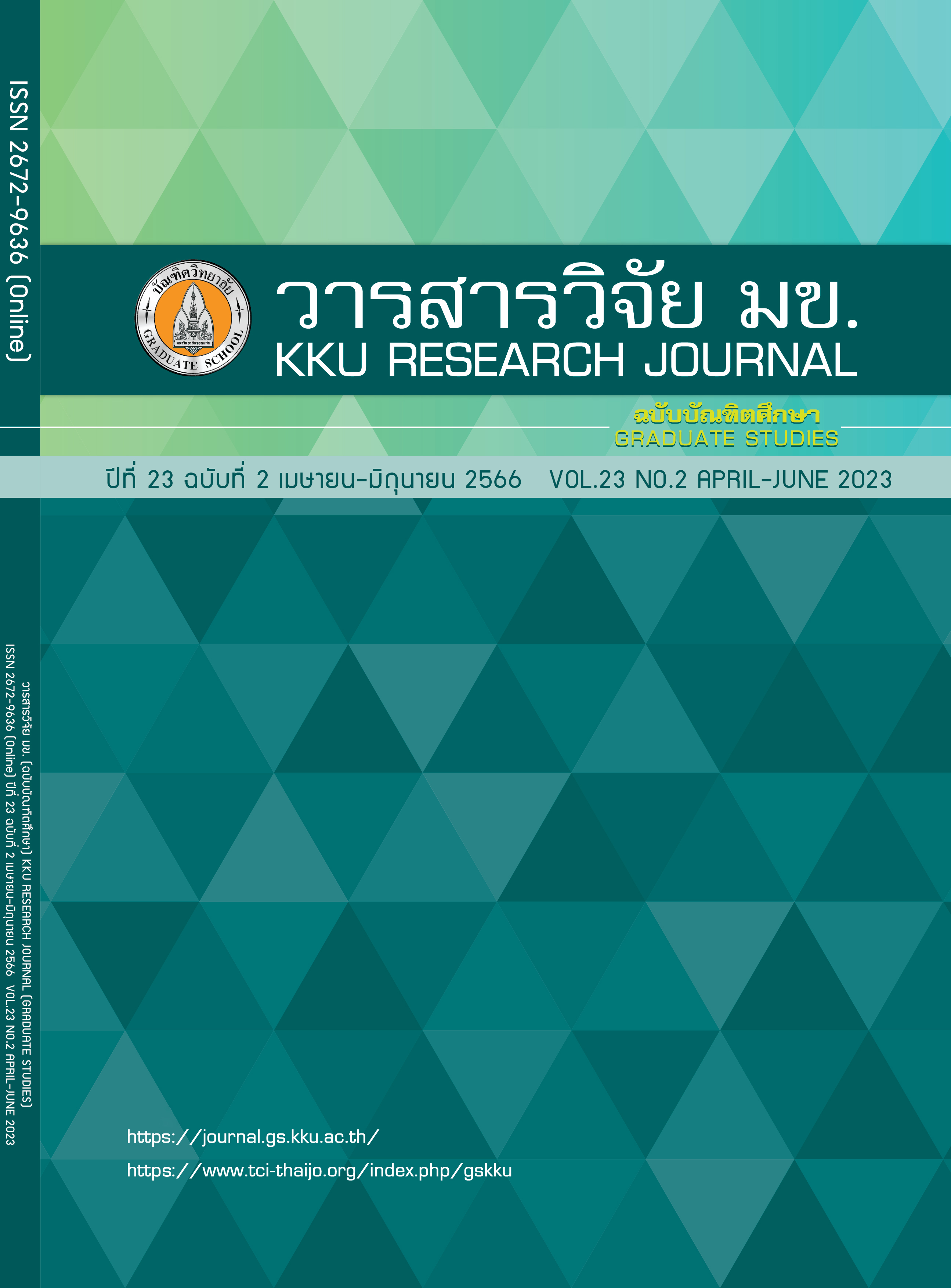The The Study of Hindrance in Adoption Blockchain Technology for Thailand's Construction Industry
Keywords:
Blockchain technology, Construction industry, Q methodologyAbstract
Today, the world is all driven by technology. The objective of this research was to study the challenge of applying blockchain technology in Thailand’s construction industry using Q Methodology and additional interviews. The interviewees consisted of 3 groups of experts, namely, educational personnel, technology agencies that use or know blockchain technology and the construction industry summing up to 14 people. The research results revealed that the respondents were divided into 5 groups those are: 1) Technology efficiency, 2) Thailand’s Technology acceptance, 3) Technology cost, 4) Difficulty of the technology implementation, and 5) Technological access. As of now, blockchain technology is still very novel to Thailand's construction industry, which lacks practical examples and needs to be studied further.
References
Balasubramanian S, Shukla V, Sethi JS, Islam N, Saloum R. A readiness assessment framework for Blockchain adoption: A healthcare case study. 2021.Technological Forecasting and Social Change 165.
Barbosa JC, Willoughby P, Rosenberg CA, Mrtek RG. Statistical methodology: VII. Q-methodology, a structural analytic approach to medical subjectivity. Academic Emergency Medicine 1998. 5, 1032–1040.
Barnes III BW, Xiao B. Organizational adoption of blockchain technology: An ecosystem perspective. in Proceedings of the 2019 DIGIT Workshop.
Barrense-Dias Y, Akre C, Suris JC, Berchtold A. Opinions of adolescents on prevention related to sexting: A Q-methodology study. Sexuality Research and Social Policy. 2020 Dec;17(4):753/64.
Barry J, Proops J. Seeking sustainability discourses with Q methodology. Ecological Economics 28, 1999. 337–345.
Batubara FR, Ubacht J, Janssen M. Challenges of blockchain technology adoption for e-government: A systematic literature review. in ACM International Conference Proceeding Series 2018.
Beckham Hooff S, Botetzagias I, Kizos A. Seeing the wind (farm): Applying Q-methodology to understand the public’s reception of the visuals around a wind farm development. Environmental Communication. 2017 Sep 3;11(5):700/22.
Çaldağ MT, Gökalp E. Exploring critical success factors for blockchain-based intelligent transportation systems. Emerging Science Journal. 2020. 4, 27–44.
Chetneti S. training course Block Chain and Bit Coin This work by Rangsit University is a part of Thai MOOC 2020.
Choi D, Chung CY, Seyha T, Young J. Factors affecting organizations’ resistance to the adoption of blockchain technology in supply networks. Sustainability. 2020 Jan;12(21):8882.
Clohessy T, Treiblmaier H, Acton T, Rogers N. Antecedents of blockchain adoption: An integrative framework. Strategic Change. 2020 Sep;29(5):501/15.
Clohessy T, Acton T. Investigating the influence of organizational factors on blockchain adoption: An innovation theory perspective. Industrial Management and Data Systems 2019.119, 1457–1491.
Gong Y, Liao JH. Blockchain technology and simulation case analysis to construct a big data platform for urban intelligent transportation. Journal of Highway and Transportation Research and Development (english Edition). 2019 Dec 1;13(4):77-87.
Hoelscher J. Diffused art and diffracted objecthood: Painting in the distributed field. College Arts Association, Painting in the Digital Age: Twenty-First-Century Recontextualization 2014. Hilton Hotel, Chicago, IL, 15.
Holotiuk F, Pisani F, Moormann J. Radicalness of blockchain: an assessment based on its impact on the payments industry. Technology Analysis & Strategic Management. 2019 Aug 3;31(8):915/28.
Kamble SS, Gunasekaran A, Kumar V, Belhadi A, Foropon C. A machine learning based approach for predicting blockchain adoption in supply Chain. Technological Forecasting and Social Change. 2021 Feb 1;163:120465.
Kamble S, Gunasekaran A, Arha H. Understanding the Blockchain technology adoption in supply chains-Indian context. International Journal of Production Research 2019. 57, 2009–2033.
Kapassa E, Themistocleous M, Quintanilla JR, Touloupos M, Papadaki M. Blockchain in smart energy grids: a market analysis. InEuropean, Mediterranean, and Middle Eastern Conference on Information Systems 2020 Nov 25 (pp. 113-124). Springer, Cham.
Kouhizadeh M, Saberi S, Sarkis J. Blockchain technology and the sustainable supply chain: Theoretically exploring adoption barriers. International Journal of Production Economics. 2021 Jan 1;231:107831.
Li J, Greenwood D, Kassem M. Blockchain in the built environment and construction industry: A systematic review, conceptual models and practical use cases. Automation in construction. 2019 Jun 1;102:288-307.
Malik S, Chadhar M, Chetty M, Vatanasakdakul S. An exploratory study of the adoption of blockchain technology among australian organizations: A theoretical model. InEuropean, Mediterranean, and Middle Eastern Conference on Information Systems 2020 Nov 25 (pp. 205-220). Springer, Cham.
Mangnormake V, Charnwasununth P, Aksorn P. Risk Identification and Analysis of Airport Construction Project in Lao PDR Case Study: Nongkhang Airport Construction Project. 2017. KKU RESEARCH JOURNAL (GRADUATE STUDY) Vol. 17 NO.4: October-December.
Nost E, Robertson M, Lave R. Q-method and the performance of subjectivity: reflections from a survey of US stream restoration practitioners. Geoforum. 2019 Oct 1;105:23/31.
Paliwal V, Chandra S, Sharma S. Blockchain technology for sustainable supply chain management: A systematic literature review and a classification framework. Sustainability. 2020 Jan;12(18):7638.
Perera S, Nanayakkara S, Rodrigo MN, Senaratne S, Weinand R. Blockchain technology: Is it hype or real in the construction industry?. Journal of Industrial Information Integration. 2020 Mar 1;17:100125.
Rieber LP. Q methodology in learning, design, and technology: An introduction. Educational Technology Research and Development. 2020 Oct;68(5):2529/49.
Rodrigo MNN, Perera S, Senaratne S, Jin X. Potential application of blockchain technology for embodied carbon estimating in construction supply chains. 2020. Buildings 10.
Sincharoonsak T, Nakavisute I. Effedct of blockchain on accounting information security. Journal of MCU Nakhondhat. 2020 May 20;7(5):1/1.
Toufaily E, Zalan T, Dhaou SB. A framework of blockchain technology adoption: An investigation of challenges and expected value. Information & Management. 2021 Apr 1;58(3):103444.
Wang J, Wu P, Wang X, Shou W. The outlook of blockchain technology for construction engineering management. Frontiers of engineering management. 2017:67/75.
Wang S, Huang C, Li J, Yuan Y, Wang FY. Decentralized construction of knowledge graphs for deep recommender systems based on blockchain-powered smart contracts. 2019. IEEE Access 7, 136951–136961.
Yoshizawa G, Iwase M, Okumoto M, Tahara K, Takahashi S. Q workshop: An application of Q methodology for visualizing, deliberating and learning contrasting perspectives. International Journal of Environmental and Science Education 11 2016. 6277–6302.
Downloads
Published
Issue
Section
License
Copyright (c) 2023 KKU Research Journal (Graduate Studies)

This work is licensed under a Creative Commons Attribution-NonCommercial-NoDerivatives 4.0 International License.



